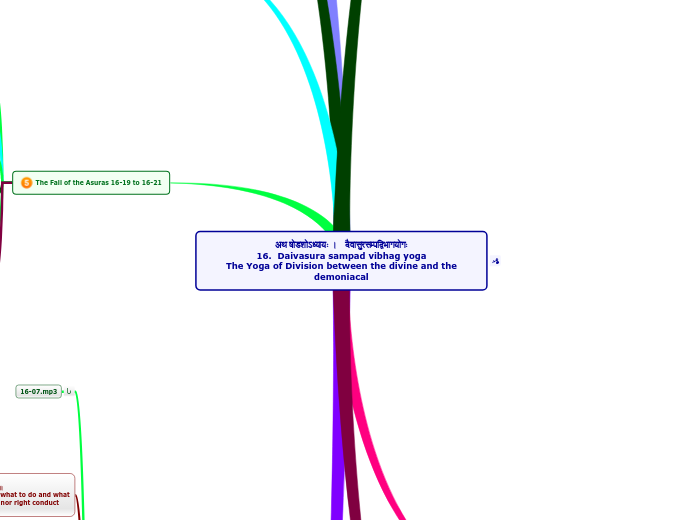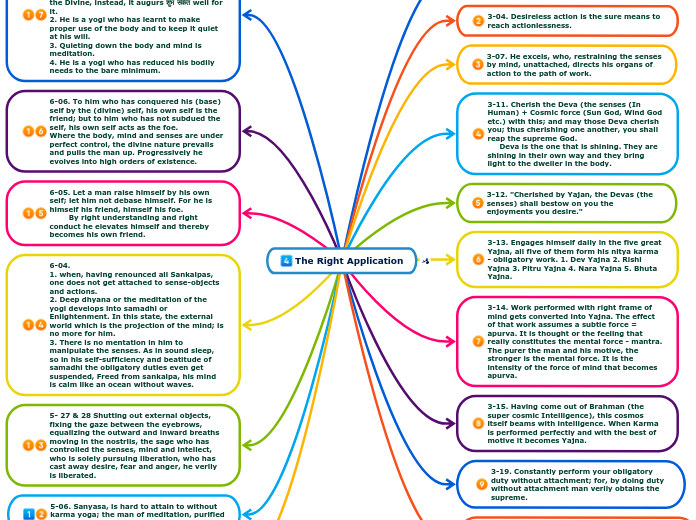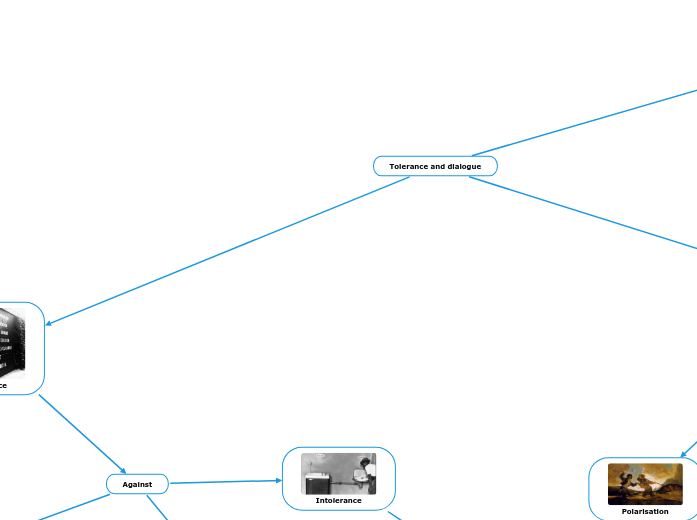अथ षोडशोऽध्यायः । दैवासुरसम्पद्विभागयोगः
16. Daivasura sampad vibhag yoga
The Yoga of Division between the divine and the demoniacal
What is the outcome of the variation in temperaments? The answer comes:-
The Effects of the Two Traits 16-05 & 16-06
What are the classifications of the Jivatmans and how are they made? The answer comes :-
द्वौ भूतसर्गौ लोकेऽस्मिन्दैव आसुर एव च ।
दैवो विस्तरशः प्रोक्त आसुरं पार्थ मे शृणु ॥ १६-६॥
16-06 There are two types of beings in this world, the divine and the demoniacal; the divine has been described at length; hear from Me, 0 Partha, of the demoniacal.
Beings mobile and immobile all possess countless characteristics. But they may be all easily brought under two broad types- the divine and the demoniacal. The former is pleasing and the latter disquieting. The one aids evolution and the other retards it. The divine elements have already been elaborated upon; the Asura elements yet remain to be explained. Negative ideas and ideals which are detrimental to the spiritual growth of man, find no place in a dissertation like the Bhagavad Gita. Still, when the potential harm in them is pointed out, the sadhaka is able to guard himself against those evils. For this reason the Lord dilates on them to the extent necessary.
16-06.mp3
दैवी सम्पद्विमोक्षाय निबन्धायासुरी मता ।
मा शुचः सम्पदं दैवीमभिजातोऽसि पाण्डव ॥ १६-५॥
16-05 The divine nature is deemed for liberation, the demoniacal for bondage; grieve not, 0 Pandava, you are born for a divine state.
The tendencies acquired by a soul during a lifetime do not get lost with it. They are carried in a potential form for further development in births yet to come. The divine traits assimilated in successive transmigrations contribute for liberation from Samsara or the trail of births and deaths. The demoniac traits on the other hand forge the bondage of phenomenal existence and perpetuate the cycle of births and deaths. There is a possibility of Arjuna's doubting about the state into which he is born. The Lord who is the knower of the past, present and future of the Jivatman allays this doubt, by assuring him of his divine state and of his being quite fit for emancipation.
16-05.mp3
The demoniacal nature which is the opposite is next delineated :-
The Demonic Traits 16-04
दम्भो दर्पोऽभिमानश्च क्रोधः पारुष्यमेव च ।
अज्ञानं चाभिजातस्य पार्थ सम्पदमासुरीम् ॥ १६-४॥
16-04 Ostentation, arrogance and self-conceit, anger and also harshness and Ignorance belong to one who is born, 0 Partha, for a demoniac state.
5. Ignorance अज्ञानं:-
He exhibits his harshness by caricaturing a weak man as strong, a blind man as having beautiful eyes and a poor man as rich. He evinces ignorance by holding unrighteousness as righteousness.
4. Anger क्रोधः :- As a dog greets another strange dog with a snarl ((of an animal such as a dog) make an aggressive growl with bared teeth.), the demoniac man asserts his individuality with anger.
3. Conceit :-
Priding oneself on being educated, moneyed and high-born is conceit.
2. Arrogance :-
Presuming oneself as superior to others is arrogance.
1. Ostentation :-
Putting up a show of good behaviour and donning oneself in pompous garments is ostentation.
Rice cakes have their exterior coating made of rice flour. But their inner contents are of different edibles. Similarly in external appearance all are human beings. But in their mental make up they vary from the divine to the devilish. -Sri Ramakrishna
16-04.mp3
The Divine Traits 16-01 to 16-03
तेजः क्षमा धृतिः शौचमद्रोहो नातिमानिता ।
भवन्ति सम्पदं दैवीमभिजातस्य भारत ॥ १६-३॥
16-03 Vigour, forgiveness, fortitude, purity, absence of hatred, absence of pride, these belong to one born for a divine state, 0 Bharata.
All the virtues enumerated in the above three stanzas bring man divine nature into relief.
6. Natimanita नातिमानिता:-
The natural tendency of man is to appear important in the eyes of others. His self-assumed importance expresses itself as pride - atimanita. But a true inquiry into the glory of God compels man to relinquish pride as a disease of the mind.
5. Adroha :-
In the process of the evolution of beings hatred has its part to play; and so it gets ingrained in them. But it is a blemish in a highly evolved state. Therefore it has to be erased from the mind. Adroha means absence of hatred.
4. Saucham शौचम
Saucham शौचम means purity both within and without. External cleanliness is easy of observance. But keeping the mind clean is more important. When the mind is pure, speech and action become naturally wholesome.
3. Dhrtih:-
Dhrtih means fortitude. It is an attitude of mind which serves both as a tonic to and antidote against the weariness of, the body and mind. It wards off slackness.
2. Kshama :-
Kshama means forgiveness. It is the ornament of a hero who has the capacity and the opportunity to avenge the wrongs done to him, but who does not exercise his power for self-assertion. Instead, he aims at self-effacement by forgiving the offender and forgetting the wrong.
1. Tejas:-
To be imbued (inspire or permeate with a feeling or quality.) with tejas or vigour is a divine quality. This energy is always utilized for putting down evil and for upholding virtue.
16-03.mp3
अहिंसा सत्यमक्रोधस्त्यागः शान्तिरपैशुनम् ।
दया भूतेष्वलोलुप्त्वं मार्दवं ह्रीरचापलम् ॥ १६-२॥
16-02 Non-injury, truth, absence of anger, renunciation, serenity, absence of calumny, compassion to beings, uncovetousness, gentleness, modesty, absence of fickleness.
11. Achapalam:-
Shaking the body and the limbs unnecessarily and fidgeting on flimsy grounds are the symptoms of crudity. Achapalam or the absence of fickleness is seen in one endowed with a divine element.
10. Hrih:-
Praise tickles the vanity of an ordinary man. But a cultured person feels bashful when praised. It is the sign of modesty- hrih.
9. Mardavam:-
Mardavam means gentleness. It is found in those who are refined in character.
8. Aloluptvam:-
No thought of appropriating the properties of others should rise in the mind of one at whose disposal they happen to be placed. That individual is then said to be established in uncovetousness aloluptvam.
7. Bhutesu daya:-
When the sight of other beings in distress draws out sympathy and fellow feeling, it is a mark of compassion to being - bhutesu daya.
6. Apaisunam अपैशुनम्:-
Calumny is disrespect for others and misrepresenting them on flimsy or false grounds; it is born of a low mentality. But a sadhaka imbued with divine traits is genuinely free from calumny- apaisunam अपैशुनम्.
5. Santi:-
Every time mind gets disturbed it loses its stamina. But as it gains in poise and equilibrium it is progressing towards serenity- santi.
4. Tyagah:-
All things sentient and insentient belong to Iswara and not to man. To be fixed in this fundamental is renunciation - tyagah.
3. Akrodhah:-
Anger makes its appearance in one when one feels that others do not come up to one's expectations. In other words, when one's desires are obstructed, one rises in anger. But when one remains unaffected by the behaviour of others, one does not fall a victim to anger- this is akrodhah.
2. Satyam:-
God is truth and the phenomenon a mere appearance. Directing one's mind, speech and action to postulating and glorifying God is truth. Whatever is done, said or countenanced to esteem earthly life is the negation of truth or satyam.
1. Ahimsa:-
All lives at all levels are the manifestations of the one Cosmic Life- the Lord. Recognizing sacredness in them and not choosing to hurt them for sport, is non-injury- ahimsa.
16-02.mp3
The Blessed Lord said:
अभयं सत्त्वसंशुद्धिर्ज्ञानयोगव्यवस्थितिः ।
दानं दमश्च यज्ञश्च स्वाध्यायस्तप आर्जवम् ॥ १६-१॥
16-01 Fearlessness, purity of heart, steadfastness in knowledge and yoga, almsgiving (the practice of giving money or food to poor people.), control of the senses, Yajna, study of the scriptures, austerity and straightforwardness.
9. Straightforwardness
Straightforwardness is just the opposite of crookedness. It is the act of harmonizing the thought, word and deed on noble purposes frankly and openly.
8. Austerity
It is possible for man to recast his mind, to improve upon his mode of life and to give himself over to spirituality. When all these acts are undertaken deliberately, it is austerity-tapas.
7. The study of the scriptures
The study of the scriptures is the prerogative of man. The seers, sages and saints have left them as an invaluable legacy. It is open to man to pursue those sacred books devotedly and critically too if he is so inclined. This study is the healthiest of all. It rids man of superstition and guides him God ward.
6. Yajna:-
Yajna means sacrifice. Any act that brings the maximum public good and that cures the performer of his selfishness, is Yajna. It need not necessarily be a traditional ritual associated with the sacrificial fire, the priest and the oblation. Self-effacement, glorifying God and the benefaction to people-these are the marks of a well performed Yajna.
5. Control of the senses :-
The senses are prone to indulgence thereby causing harm to the enjoyer. They are the gateways to hell when they run riot. Curbing them is the first step in the path of discipline. Mastery over the senses brings in its train all blessings leading to the Divine.
4. Almsgiving:-
Benefaction extended on right lines is almsgiving. The heart expands when one shares the things good and useful with deserving people. Genuine gifts are those which are offered with love, kindness and humility.
3. Steadfastness in knowledge and yoga
He who is able to distinguish between the things that are lasting and those that are evanescent, is gifted with jnana or knowledge. It is yoga when one seeks that which is permanent and shuns that which is impermanent. Great is the result when there is steadfastness in the pursuit of both knowledge and yoga.
2. The purity of heart:-
One is said to be established in the purity of heart when one makes no difference whatsoever between the welfare of oneself and the welfare of others.
1. fearlessness:-
Fear in all of its forms resolves itself into the fear of being hurt or killed.
It is based on the ignorance that one is the body and not the Atman.
The one given to fear is good for nothing.
But all merits are born of fearlessness. The symbolic pose of abhaya or fearlessness is characteristic of all the Deities that represent Iswara.
The idea is that Godhood and fear are incompatible. As a sadhaka draws near God, he rids himself of all fears.
16-01.mp3
The Demoniacal Ways 16-07 to 16-18
अहङ्कारं बलं दर्पं कामं क्रोधं च संश्रिताः ।
मामात्मपरदेहेषु प्रद्विषन्तोऽभ्यसूयकाः ॥ १६-१८॥
16-18 Given over to egoism, power, insolence, lust and wrath, these malicious people hate Me in their own bodies and those of others.
Men of demoniacal disposition magnify whatever little merit that is found in them and claim for themselves qualifications to which they are utter strangers. It is impossible to rid them of conceit born of ignorance. The power that is theirs is utilized for humiliating others. The insolence inherent in them goads them ever into the wrong path. That the Lord's benign presence is in the hearts of all is denied by them. By sense-indulgence they despoil their bodies which are all the temples of God; by hurting others they commit the same offence again against God. The downfall of the demoniac is in this way sealed.
16-18.mp3
The Asuras also resort to the performance of Yajna. The mode of it is as follows:-
आत्मसम्भाविताः स्तब्धा धनमानमदान्विताः ।
यजन्ते नामयज्ञैस्ते दम्भेनाविधिपूर्वकम् ॥ १६-१७॥
16-17 Self-conceited, stubborn, filled with the pride and intoxication of wealth, they perform sacrifice in name for ostentation, disregarding ordinance.
The performance of rituals has undergone change with the passage of time. The performance of Yajna has become scarce in these days, the temple worship having taken up its place.
There are people today who build temples for self-advertisement, who conduct religious celebrations for pomp and show and who arrange for elaborate and costly worship in temples not for devotion but for name and fame.
16-17.mp3
अनेकचित्तविभ्रान्ता मोहजालसमावृताः ।
प्रसक्ताः कामभोगेषु पतन्ति नरकेऽशुचौ ॥ १६-१६॥
16-16 Bewildered by many a fancy, enmeshed in the snare of delusion, addicted to the gratification of lust, they fall into a foul hell.
Whatever one has in one's mind is projected by that one on the world outside and fancied as an external reality. To the one good at heart the external world is a heaven.
But to another vile at heart, the same world offers a spectacle of a foul hell.
16-16.mp3
आढ्योऽभिजनवानस्मि कोऽन्योऽस्ति सदृशो मया ।
यक्ष्ये दास्यामि मोदिष्य इत्यज्ञानविमोहिताः ॥ १६-१५॥
16-15 "I am rich and well-born. Who else is equal to me? I will sacrifice, I will give alms, I will rejoice." Thus deluded by ignorance;
16-15.mp3
असौ मया हतः शत्रुर्हनिष्ये चापरानपि ।
ईश्वरोऽहमहं भोगी सिद्धोऽहं बलवान्सुखी ॥ १६-१४॥
16-14 "That enemy has been slain by me, and others also shall I slay. I am a lord, I enjoy, I am successful, powerful and happy."
16-14.mp3
इदमद्य मया लब्धमिमं प्राप्स्ये मनोरथम् ।
इदमस्तीदमपि मे भविष्यति पुनर्धनम् ॥ १६-१३॥
16-13 "This today has been gained by me; this desire I shall fulfil; this is mine, and this wealth also shall be mine in future."
16-13.mp3
आशापाशशतैर्बद्धाः कामक्रोधपरायणाः ।
ईहन्ते कामभोगार्थमन्यायेनार्थसञ्चयान् ॥ १६-१२॥
16-12 Bound by a hundred ties of hope, given over to lust and anger, they strive to secure by unjust means hoards of wealth for sensual enjoyment.
Dravya yajna or the worship of the Lord through the acquisition of wealth by fair means and the expenditure of it on noble causes, is enjoined in the scriptures; and the virtuous people adopt it in their lives.
But the men of Asura mould make life complicated by cruel competition. Frenzy, falsehood and fraud are the norm with them. They amass wealth rapaciously for voluptuous sense-indulgence.
Men are of two kinds. Those of mere man's mould only are base and vulgar. Lust and greed for wealth govern them. But the superior kind of men strive for spiritual eminence. --Sri Ramakrishna
16-12.mp3
The evil ways of the diabolical are further illustrated :-
काममाश्रित्य दुष्पूरं दम्भमानमदान्विताः ।
मोहाद्गृहीत्वासद्ग्राहान्प्रवर्तन्तेऽशुचिव्रताः ॥ १६-१०॥
16-10 Filled with insatiable desires, full of hypocrisy, pride and arrogance, holding evil ideas through delusion, they work with impure resolve;
चिन्तामपरिमेयां च प्रलयान्तामुपाश्रिताः ।
कामोपभोगपरमा एतावदिति निश्चिताः ॥ १६-११॥
16-11 Beset with immense cares ending only with death, regarding gratification of lust as the highest, and feeling sure that that is all;
Their base and boisterous passions seem to the others to have come to an end with death. But actually those passions get buried in their inner core, only to remanifest themselves in the next birth. Tendencies become latent at death as they do in sleep.
The earth-bound people do not learn a lesson even when overcome with acute pain, disappointments, failures - and misfortunes in life. They are like the camels which go on biting off thorny shrubs unmindful of the bleeding caused to their lips.
A dearly loved wife dies or deserts; the man forgets all about it and remarries. The sudden passing away of a beloved child brings in desolation. But in a few days he brushes it aside and gets absorbed in life. The mother weeps and wails over the death of her baby. The next moment she is busy arranging her jewels and costly clothings, scrupulously attending to her toilet as well. The parents are driven into penury because of the marriages of two or three daughters. Still the begetting continues as usual! In litigation the property is drained away; but on that ground further litigation does not stop. Though there is no wherewithal to maintain the existing brood of children, new additions do not fail to come in year after year. How strange! -Sri Ramakrishna
16-11.mp3
16-10.mp3
What kind of life do the men of this creed live? The answer comes :-
एतां दृष्टिमवष्टभ्य नष्टात्मानोऽल्पबुद्धयः ।
प्रभवन्त्युग्रकर्माणः क्षयाय जगतोऽहिताः ॥ १६-९॥
16-09 Holding this view, these ruined souls of small intellect, of fierce deeds, rise as the enemies of the world for its destruction.
1. Man's intellect dwindles away as he becomes slave to the senses.
2. Inordinate sense indulgence ends in self-annihilation.
3. Adharma or wickedness is the outcome of it.
4. This vicious act contaminates the world and causes the greatest harm.
5. Still, they have a negative purpose to serve.
6. That falsehood and wickedness are not the paths to self-emancipation, is made evident by the base life of the demoniac.
16-09.mp3
असत्यमप्रतिष्ठं ते जगदाहुरनीश्वरम् ।
अपरस्परसम्भूतं किमन्यत्कामहैतुकम् ॥ १६-८॥
16-08 They say, "the universe is unreal, without a moral basis, without a God, horn of mutual union, brought about by lust; what else?"
Truth, dharma and God are the different expressions of the Reality which governs the universe. The knowers, the believers, the moralists and the theists are those who live in tune with God's Law.
The infidels, the profligates, the atheists and the nihilists are those who deny or defy the Law. Whatever is, is the outcome of lust and it may therefore be lustfully indulged in - is the creed of this type of people.
A worldling can easily be known from the way in which he dislikes matters religious. He objects to the chanting of the name of the Lord and to listening to the singing of His glory. He prevents the others from taking to the path of religion. Religious institutions are condemned by him. He openly ridicules the holy men and the holy orders. Such behaviour is the mark of the man steeped in worldliness. - Sri Ramakrishna
16-08.mp3
प्रवृत्तिं च निवृत्तिं च जना न विदुरासुराः ।
न शौचं नापि चाचारो न सत्यं तेषु विद्यते ॥ १६-७॥
16-07 The demoniac know not what to do and what to refrain from; neither purity, nor right conduct nor truth is found in them.
1. Commendable acts are those which are conducive to the general welfare of man. They are designated as dharma.
2. Prohibited acts are those which deprave man and ruin his career. They are condemned as adharma.
3. The good always conform to dharma.
4. Animals are not altogether ignorant of dharma and adharma. Instinctively they understand what to do and what to refrain from.
But men of the Asura type are devoid of discrimination in this respect.
1. Impure thoughts alone sprout in their minds.
2. Their physical habits and doings are anything but clean.
3. Utterances coming out from them are distorted, diabolical and devoid of truth.
4. Pollution of the entire personality is what is found in them.
If the demoniac be asked as to why they behave malignantly, the justification they make betrays their disposition.
16-07.mp3
The Fall of the Asuras 16-19 to 16-21
What is the root cause of the depravity of man? The answer comes :-
त्रिविधं नरकस्येदं द्वारं नाशनमात्मनः ।
कामः क्रोधस्तथा लोभस्तस्मादेतत्त्रयं त्यजेत् ॥ १६-२१॥
16-21 Triple is this gate of hell, destructive of the selflust, anger and greed; therefore should one abandon these three.
The origin of the demoniacal disposition is pointed out here. It is fostered by these three evils. The nature of greed is to appropriate all objects of sense-enjoyment exclusively to oneself. Any one of the three vices mentioned here is sufficient to bind man to abomination. Woe unto man when all the three make an alliance and rule his mind. They do not allow him to emerge from wickedness.
Triple is this gate of hell, destructive of the self
1. lust,
2. anger and
3. greed;
therefore should one abandon these three.
16-21.mp3
आसुरीं योनिमापन्ना मूढा जन्मनि जन्मनि ।
मामप्राप्यैव कौन्तेय ततो यान्त्यधमां गतिम् ॥ १६-२०॥
16-20 Entering into demoniac wombs, the deluded ones, in birth after birth, without ever reaching Me, they thus fall, 0 Kaunteya, into a condition still lower.
The base nature in a man hurls him into states baser and yet baser. Like a stone rolled down the slope of a hill, he falls into the abyss of depravity.
16-20.mp3
तानहं द्विषतः क्रूरान्संसारेषु नराधमान् ।
क्षिपाम्यजस्रमशुभानासुरीष्वेव योनिषु ॥ १६-१९॥
16-19 Those cruel haters, worst among men in the world, I hurl these evil-doers for ever into the wombs of the demons only.
Transmigration into the high or the low is according to karma. And its continuity is kept up by the force of karma which persists until the dawn of knowledge. The Lord therefore makes this statement.
16-19.mp3
Liberation from the Asura Fetters 16-22
Is there then no hope of emancipation to the man caught in the whirlpool of this three-faced hell? The answer comes :-
एतैर्विमुक्तः कौन्तेय तमोद्वारैस्त्रिभिर्नरः ।
आचरत्यात्मनः श्रेयस्ततो याति परां गतिम् ॥ १६-२२॥
16-22 The man who is liberated from these three gates to darkness, 0 Kaunteya, practises what is good for him and thus goes to the Supreme Good.
Misery is another name for hell. Whenever man is afflicted and unhappy he is for the time being in hell. And why should there be this unwanted hellishness for him? It is all due to his want of insight. Ignorance is the root of all misery. It is again the originator of lust, anger and greed. The Satan of ignorance is the instigator inducing man to indulge in lust, anger and greed. When these three evils are eliminated, the path of enlightenment opens. The darkness of ignorance vanishes of its own accord. Man progresses in Sreyas. When the demoniacal man takes to the divine way his progress is very rapid. A zealous convert that he is, he hastens quickly Godward.
16-22.mp3
Which is the unerring guidance that helps man go God ward? The guidance comes :-
scripture is the Guide-16-23 & 16-24
तस्माच्छास्त्रं प्रमाणं ते कार्याकार्यव्यवस्थितौ ।
ज्ञात्वा शास्त्रविधानोक्तं कर्म कर्तुमिहार्हसि ॥ १६-२४॥
16-24 Therefore, let the scriptures be your authority in deciding what ought to be done and what ought not to be done. Having known what is said in the ordinance of the scriptures you should act here.
The purpose of the scriptures is to guide man in living a perfect life on earth and to remind him repeatedly of the Supreme Goal which is supramundane and which ought to be sought after earnestly. This being the case, bound as man is both to karma and to earth, whatever he does here on earth ought to get the sanction of the scriptures. And those that are divinely disposed involuntarily do acts that are quite in tune with the teachings of the scriptures. In fact their doings and the injunctions of the scriptures are in corroboration of one another.
"What particular Sastra do you follow?" was the question put to Sri Ramakrishna by a devotee "I follow no Sastra whatever. I plead with the Deity residing in my heart for directions, and I act and live as I am guided by that Being. Therefore, I have not made any mistake in my life. What I am made to do and to utter by the Deity within, would not come into conflict with the Sastras." This was the answer given by -Sri Ramakrishna
16-24.mp3
यः शास्त्रविधिमुत्सृज्य वर्तते कामकारतः ।
न स सिद्धिमवाप्नोति न सुखं न परां गतिम् ॥ १६-२३॥
16-23 He who, casting aside the ordinances of the scriptures, acts on the impulse of desire, attains not perfection, nor happiness nor the Supreme Goal.
1. The function of the scriptures is to guide man to perfection.
2. The injunction from them comes both positively and negatively.
3. Exhortation to do the good and auspicious is the positive injunction; and admonition against doing the bad and harmful deeds is the negative injunction.
But the way of the Asuras is to behave counter to the teachings of the scriptures. They indulge in the prohibited acts and refrain from the sanctioned ones.
Whereas by obeying and faithfully following the ordinances of the scriptures, man progresses towards perfection. Its immediate result is that he gains in happiness in the life here and he prepares himself for the Supreme Goal that is to be gained ultimately.
16-23.mp3
ॐ तत्सदिति श्रीमद्भगवद्गीतासूपनिषत्सु
ब्रह्मविद्यायां योगशास्त्रे श्रीकृष्णार्जुनसंवादे
दैवासुरसम्पद्विभागयोगो नाम षोडशोऽध्यायः ॥ १६॥
In the Upanishad of the Bhagavad Gita, the knowledge of Brahman, the Supreme, the science of Yoga and the dialogue between Sri Krishna and Arjuna, this is the sixteenth discourse designated :
THE YOGA OF DIVISION BETWEEN THE DIVINE AND THE DEMONIACAL









